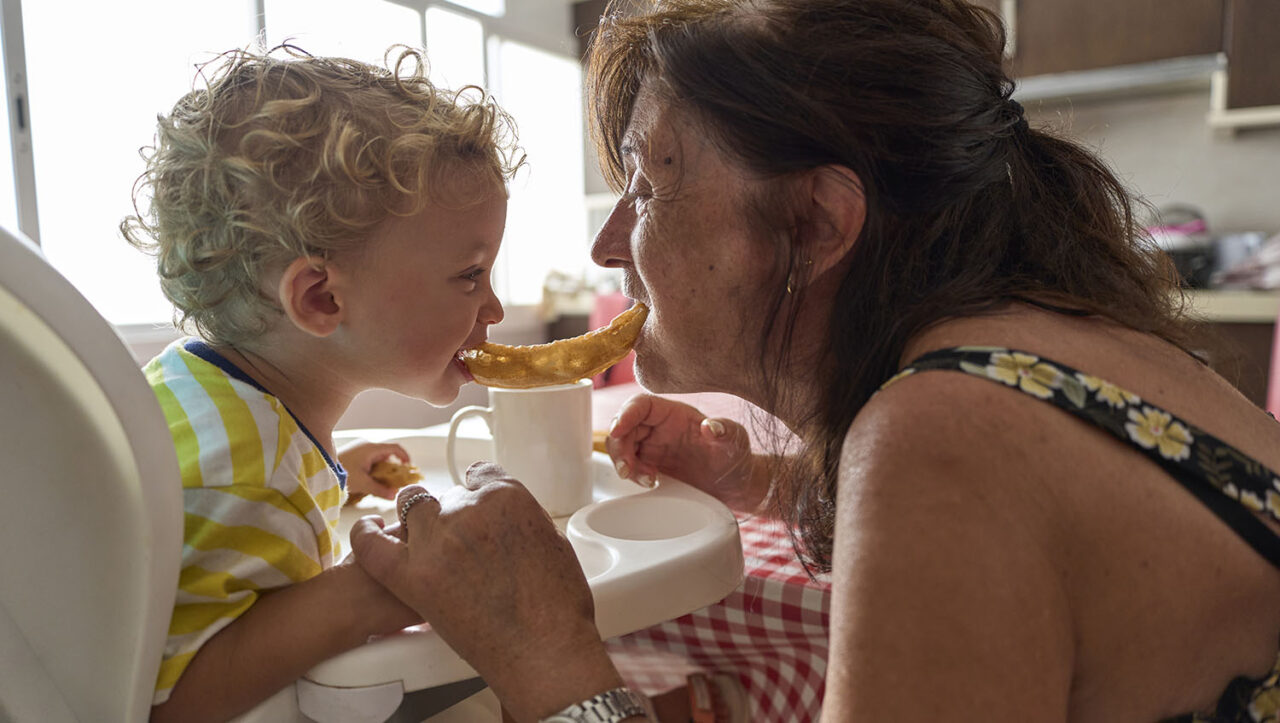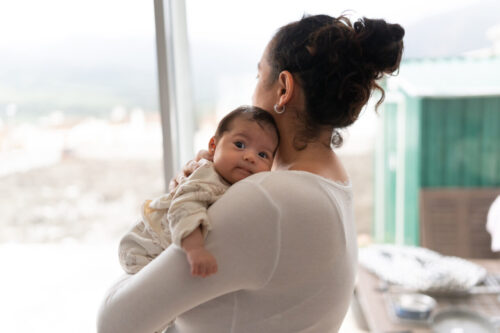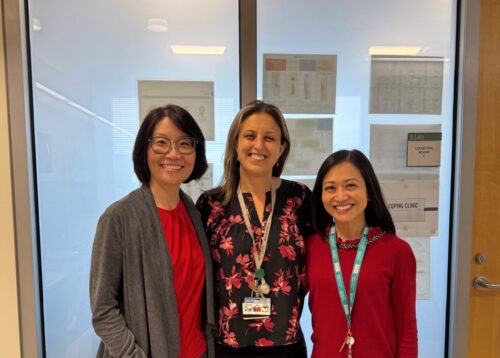New BMC Group Supports Grandparents of Children Affected by Parental Substance Use
September 19, 2024

Getty Images
When addiction disrupts families, grandparents who are thrust into caregiving face unique challenges and need dedicated support.
On Boston Common on International Overdose Awareness Day, August 31, the Massachusetts Department of Public Health and Boston Medical Center (BMC) planted 22,000 purple flags, a somber reminder of the lives lost to overdose in Massachusetts over the past decade. In 2023 alone, more than 2,100 people in the state died from opioid-related overdoses, 50% of them between the ages of 15 and 44. Many of those lost were parents, as are many of those still living with or in treatment for substance use disorder (SUD). As such, their loss or ongoing struggles affect their children’s lives and health in myriad ways, from the adverse effects of substance use during pregnancy on newborns to increased neglect and abuse, financial stresses, and loss of household stability and routines.
BMC in 2017 launched the SOFAR (Supporting Our Families through Addiction and Recovery) program to provide a medical home and wraparound services for children who have a parent with substance use disorder. The innovative multigenerational program initially aimed to reduce relapse in mothers of newborns who had gone through the hospital’s Project RESPECT program and thus were identified as parents in recovery. During the COVID-19 pandemic, SOFAR shifted to serve a wider age range, including children and teens, says Sara Stulac, MD, MPH, a BMC pediatrician and SOFAR’s medical director.
“As our cohort has grown, we’ve gotten a pretty wide range of ages,” Stulac says. “We’re seeing lots of babies still, but also lots of school-age kids who are struggling with school behavior, ADHD, and trauma, as well as an increasing cohort of teenagers who are struggling with their own questions about life and substance use.”
Stulac was the lead author on an article published in Current Problems in Pediatric and Adolescent Health Care that spells out some of the heart-wrenching emotional and logistical complexities of families dealing with substance use disorder (SUD) while trying to tend to children’s wellbeing and healthcare.
We as pediatricians are always looking at prevention and upstream issues, and how do we prevent this kid from becoming the next person who’s going to be in that scenario?
Sara Stulac, Md, mph, BMC pediatrician and SOFAR’s medical director
Over time, the SOFAR team has worked with many different family configurations, Stulac says, but one group they could see needed more focused attention was grandparents thrust into caring for their grandchildren because of parental substance use.
“Sometimes we see a child with their mom, and the next week they come in with the grandparent and the grandparent says, ‘Now I’ve got them.’ Then sometimes the kids go back and forth,” she says.
Earlier this year, the SOFAR team launched its first support group for such grandparents. Jill Baker, LICSW, a BMC social worker and assistant director of SOFAR, says that grandparents caring for grandchildren is “definitely not a new problem.” But her team is seeing an increase in grandparents stepping up for children affected by parental substance use, and they have to navigate complex challenges.
Responding to an emerging need
Alison Cohan, a licensed clinical social worker at BMC and facilitator of the new support group, says grandparents in this caregiving situation face not only practical, but emotional challenges.
“There’s the common theme of loss — losing your role as a grandparent, losing the relationship you might have had with your grandchildren and with your children. Sometimes the parents are alive and sometimes they’re deceased, so there might also be grief if they’ve lost a child,” she says. “We also see challenging dynamics where a parent might be in recovery and want to have more visitations, so they must figure out how to have boundaries with their adult child while taking care of their grandchildren.”
What’s more, she says, sometimes grandparents are acknowledging the past trauma of parenting a child who might have had an active SUD in their youth.
“A grandparent may feel guilt or remorse or fear about how they parented one child and now how they might parent another,” she says, “and they’re processing those feelings about being a different type of parent or being the same type of parent with different results.”
Further, in some cases, grandparents are also navigating the requirements and restrictions of the child welfare system as they wrestle with formalizing a foster or adoptive parent role.
“There are just so many questions and having to be comfortable in the unknown, and for older generations, therapy might not feel as comfortable or accessible,” Cohan says. “So talking with a person that’s already interacting with your family, it can give you a step up to getting that next service that might be helpful.”
A space for peer sharing
The new grandparent support group is currently offered in a drop-in format over Zoom once a month on a Wednesday morning. While an in-person group would also be valuable, Cohan says, the virtual format makes the group accessible to people beyond Boston and anyone who has difficulty getting to BMC.
Cohan takes a low-key role in the group.
“We start with introductions, who you are, what your relationship is to the child you’re raising, what the circumstances are right now around the family. And then it’s just giving space to people for whatever they need,” she says. “Just having space for people to respond with their own lived experience, rather than a therapist suggestion, is valuable. People can share experiences—’This worked for me, or this didn’t work for me, or have you thought about this idea?’ Having it come from peers rather than myself is really powerful.”
I think my biggest hope for this group is that grandparents find support in one another and it can build community outside of the group
Alison cohan, licensed clinical social worker and facilitator SOFAR’s grandparent support group
A few months in, the new group has attracted a subset of the 20 or so families Cohan is in touch with, and feedback has been positive. “We’re definitely still in the introductory phases of getting this off the ground and figuring out what the needs are,” she says.
Looking ahead
Stulac says SOFAR’s model has drawn interest from people in other parts of the country, and she hopes it can be replicated, though federal dollars more often are directed toward adult treatment and overdose prevention than toward helping the next generation.
“We as pediatricians are always looking at prevention and upstream issues, and how do we prevent this kid from becoming the next person who’s going to be in that scenario?” she says.
She adds, “We hope desperately that it’s going to help these kids grow up to be healthy and to not only be not using substances themselves, but to have less trauma or have their trauma addressed, have more stability in their lives—to have this generation of kids growing up in the opioid epidemic not become the next generation of the epidemic. If we look 10 years, 20 years into the horizon with substance use, this could be a really important part of breaking that cycle.”
As the grandparent group continues or expands, Cohan hopes to see a snowball effect.
“I think my biggest hope for this group is that grandparents find support in one another and it can build community outside of the group,” she says. “If they came to this group and realized, ‘Oh hey, we live one town over from each other, and we feel isolated in this, maybe we can go to the park, have our kids have a play date, and just have time to ourselves as well’—that would be a success story for me.”
People seeking information on the group are encouraged to reach out to Cohan at Alison.Cohan@bmc.org.


